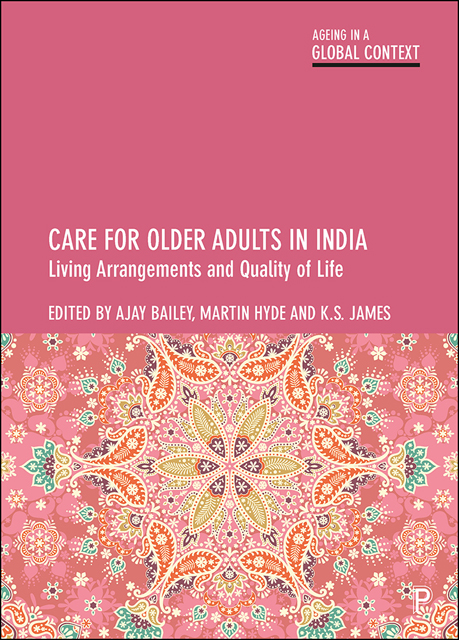Book contents
- Frontmatter
- Contents
- List of figures and tables
- Notes on the editors
- List of contributors
- Acknowledgements
- Series editors’ preface
- Map of India
- 1 Introduction: Living arrangements and care in India
- 2 Theorising care and relationships in the age of migration
- 3 Emerging living arrangements of older adults in India: patterns and welfare implications
- 4 Living arrangement concordance and the well-being of older persons in India
- 5 Family size and living arrangements among older adults in Kerala: panel data analysis, 2004– 19
- 6 Care arrangements for older adults: exploring the intergenerational contract in emigrant households of Goa, India
- 7 All my responsibilities towards my children are over! Linked lives and life course obligations among older adults with migrant children in India
- 8 Interpreting the landscapes of care for older men in Delhi and Kolkata: perspectives from care receivers and caregivers
- 9 The role of cultural meaning system and place attachment in retaining home ownership while residing in retirement homes in Kerala, India
- 10 Decision-making and choice or sine qua non? Care home entry in Tamil Nadu
- 11 Welfare and development programmes for older adults in India
- 12 Lessons and future directions for caregiving research in India
- Index
10 - Decision-making and choice or sine qua non? Care home entry in Tamil Nadu
Published online by Cambridge University Press: 13 October 2022
- Frontmatter
- Contents
- List of figures and tables
- Notes on the editors
- List of contributors
- Acknowledgements
- Series editors’ preface
- Map of India
- 1 Introduction: Living arrangements and care in India
- 2 Theorising care and relationships in the age of migration
- 3 Emerging living arrangements of older adults in India: patterns and welfare implications
- 4 Living arrangement concordance and the well-being of older persons in India
- 5 Family size and living arrangements among older adults in Kerala: panel data analysis, 2004– 19
- 6 Care arrangements for older adults: exploring the intergenerational contract in emigrant households of Goa, India
- 7 All my responsibilities towards my children are over! Linked lives and life course obligations among older adults with migrant children in India
- 8 Interpreting the landscapes of care for older men in Delhi and Kolkata: perspectives from care receivers and caregivers
- 9 The role of cultural meaning system and place attachment in retaining home ownership while residing in retirement homes in Kerala, India
- 10 Decision-making and choice or sine qua non? Care home entry in Tamil Nadu
- 11 Welfare and development programmes for older adults in India
- 12 Lessons and future directions for caregiving research in India
- Index
Summary
Background
In India, families are mandated to take care of their older members (Rajan and Mishra, 2011). The Maintenance and Welfare of Parents and Senior Citizens Act (2007) states that parents, grandparents and ‘childless’ older people who are unable to maintain themselves are entitled to demand and receive income, care and support from children, grandchildren and other relatives who have sufficient resources. Cases (where support is not forthcoming) can be taken to tribunal and can result in the issue of maintenance orders with penalties for non-compliance including fines and imprisonment. Thus, there is a reliance on informal social protection, that is, support from kin. However, changes in family structures, family values, migration of family members and a rise in the number of women working outside the home can put increasing strain on families to provide support. Traditional forms of solidarity and collectivism are eroded by market economies: increasing monetisation impacts on forms of reciprocity (Norton et al, 2001), and requirement for a responsive mobile labour force impacts on availability of caregivers (Himmelweit, 2007, Rishworth and Elliott, 2018). Therefore, it is important to challenge the ‘realities’ of family support systems which may not be as robust as portrayed by policy makers.
Social protection should provide ‘a set of public programs designed to mitigate or cope with the adverse effects of risks to income security and physical well-being’ (Kapur and Nangia, 2015, p 75). Therefore, in India, we would expect to find welfare policies and programmes that protect individuals against shocks to assets across the life course, and plug any gaps in kin support in later life which may include options to relocate to a care home. However, little is known about older people's decision-making around care and support in later life. This chapter draws on data from 30 in-depth interviews with older male and female residents of nine care homes in three districts of Tamil Nadu and addresses the following questions: i) what are the decision-making routes leading to relocation to a care home? and ii) how does culture and the political economy influence the care choices available to older people?
- Type
- Chapter
- Information
- Care for Older Adults in IndiaLiving Arrangements and Quality of Life, pp. 185 - 209Publisher: Bristol University PressPrint publication year: 2022
- 1
- Cited by



